- City Fajr Shuruq Duhr Asr Magrib Isha
- Dubai 04:20 05:42 12:28 15:53 19:08 20:30
Latest: ‘Winter is back’, or so is the cry of hopeful UAE residents as the changing weather blew in chilly climes over the past two days.
Mercury has dipped below freezing in some parts of the country, with the lowest temperature recorded on Tuesday hovered at -0.1°Celisus at Jabal Jais at 4.45am.
Meanwhile, a day earlier, the lowest temperature recorded was -1.2 °Celsius at Jabal Jais again at 6am.
Parts of Dubai experienced showers late on Monday night, with the UAE’s National Centre of Meteorology and Seismology (NCMS) confirming the worst of the storm is now behind us.
The weather over the next two days will blow in “fresh northwesterly winds will continue over the country and will reduce gradually by evening, especially over the land.”
The weather is expected to be moderate on Wednesday, with the relative humidity increasing by night and giving rise to fog late night and early morning.
The marine warning that has been in place for the past few days should lift by late Tuesday, as per the NCMS.
The past few days, most of the UAE has experienced unstable weather, bringing in rainfall and giving rise to a sandstorm with windspeeds of 70 kms per hour that saw trees uprooted and visibility drop to 200 metres.
Monday freeze
High winds and scattered rain is expected across parts of the UAE on Monday, with the mercury taking a dip to record temperatures below zero degrees in Ras Al Khaimah.
Authorities have issued warnings for residents to proceed with caution, especially into high altitude areas with strong winds still buffeting parts of the country, reaching highs of 60km per hour.
The UAE’s National Centre for Meteorology and Seismology (NCMS) has forecasted light rain in the northern part of the country on Monday, with dust and blowing sand reducing horizontal visibility in areas, specifically the Western part of the country.
The Sharjah Planetarium also issued a weather alert, saying: “Temperatures at the summit of Jabal Jais reached below zero degrees Celsius, record on Monday morning at 2am.
“There are indicators of vulnerability of the state to a low air gully air and cumulus clouds gathering in the region, with a chance of rain.”
Sharjah Police also issued a warning on Monday, tweeting on its official account: “Active wind speed ranging between 25-35 kilometres affect the state with low temperatures reaching below zero Celsius on Jabal Jais.”
The weather pattern that has been affecting the UAE these past 48 hours is a result of two low pressure systems, from the south and the northwest, colliding to result in high winds and a drop in temperatures by nearly 15 degrees Celsius in two days.
The weather is expected to ease up Tuesday, with a partly cloudy and hazy climatic condition giving way to a spike in humidity levels and the probability of fog and mist over the western region and inland areas late night and early Wednesday.
Emirati killed in accident
A 19-year-old Emirati was killed in a road accident in Al Dhait area on Saturday, when his motorcycle collided with a vehicle. According to police, weather played havoc as the driver’s vision was reduced, which resulted in the collision.
The vehicle driven by an 18-year-old Emirati suddenly swerved and entered the feeder road. He lost control of the vehicle and collided with the motorcycle, said Colonel Ali Saeed Alalkim, Director, Traffic and Patrol Department, Ras Al Khaimah Police.
Police patrols and an ambulance rushed to the site. The injured motorcyclist was transferred to the hospital, but he succumbed to critical wounds.
Police urged motorists top abide by traffic rules and speed limits, especially during such weather conditions. (Mohammed El Sadafy)
Heavy rain in Abu Dhabi, Al Ain
Heavy rainfall is being reported in parts of Abu Dhabi and Al Ain this morning, along with Sharjah and Dubai; drivers are being warned to proceed with caution.
The weather bureau has warned of continuation of a chance of light to moderate rain over scattered areas of the country on Sunday, with temperatures also taking a dip; the lowest recorded today on Jabal Jeis was 5.1 degrees Celsius 6.30am, a far cry from the 17-degree Celsius recorded on Thursday.
The sandstorm that brought its wrath down on the UAE most of Saturday finally toned down its fury in the late hours yesterday, giving way to rainfall across parts of the country, along with a drop in the Mercury of nearly 10 degrees Celsius.
The unstable weather is expected to continue over the next two days, as two low pressure systems collide over the country, with winds carrying in from the south across Saudi Arabia, along with northwesterly winds coming from Iraq, according to the National Centre for Meteorology and Seismology (NCMS).
Speaking to Emirates 24|7, a spokesperson from the NCMS said: “What we are experiencing right now is the collision of two pressure systems, one that is coming in from the south across Saudi Arabia, coupled with the northwesterly winds blowing in from as far as Iraq.
“This weather phenomenon will last for another two days, carrying windspeeds of nearly 70km per hour, with winds polluted with blowing dust and sand that has reduced visibility to as low as 200 metres near Ras Al Khaimah Airport and around 500 metres near Al Maktoum International Airport, Dubai.”
The force of the storm on Saturday resulted in trees uprooted, debris on the roads and horizontal visibility dropping as low as 200 metres.
However, later in the day, the windspeed eventually died down to a manageable 45kms per hour, bringing rain across parts of Dubai and Umm Al Quwain late evening.
The NCMS also confirmed the blistering heat of the past few days, which saw the temperatures spike to 39-degrees Celsius on Thursday, will finally see respite.
The spokesperson said: "The low pressure system will finally bring in some relief from the heat, with a drop in temperatures of nearly 10-12 degrees, settling in around 26-degrees Celsius on Sunday and Monday."
The following two days will continue to bring in hazy, dusty weather, fresh to strong northwesterly winds, especially over the sea, causing blowing sand and reducing the horizontal visibility with another fall in temperatures.
The cloud amount will also increase over the islands and the northern areas, with a chance of rainfall.
The marine warning remains in place, with the sea expected to be rough to very rough at times in the Arabian Gulf and Oman Sea.
Sharjah Police, which enlisted a forced shutdown of Khor Kalba Cornice yesterday, has told drivers to remain vigilant in wake of the storm.
Stormy Saturday
The country’s National Centre for Meteorology and Seismology (NCMS) has recorded waves reaching heights of 10 feet, even as the country’s National Emergency Crisis and Disaster Management Authority (NCEMA) issues warnings to those venturing out today as windspeed hits highs of 70km per hour.
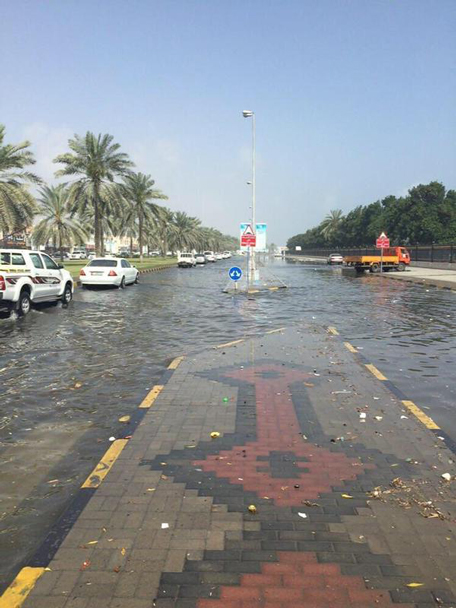
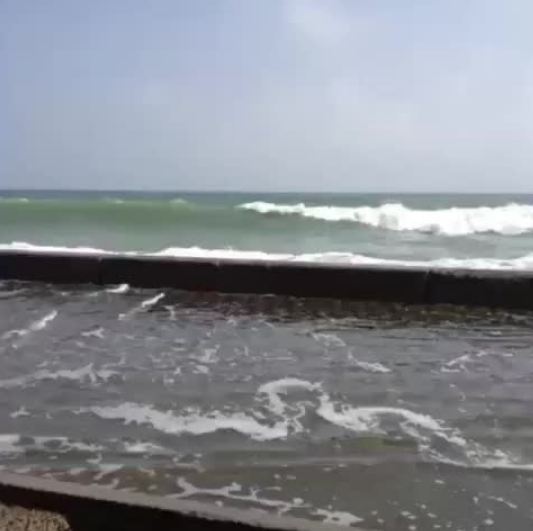
Speaking to Emirates 24|7, a spokesperson from the NCMS warned the weather pattern is expected to last another 48 hours as two pressure systems collide over the country.
The spokesperson said: “What we are experiencing right now is the collision of two pressure systems, one that is coming in from the south across Saudi Arabia, coupled with the northwesterly winds blowing in from as far as Iraq.
“This weather phenomenon will last for another two days, carrying windspeeds of nearly 70km per hour, with winds polluted with blowing dust and sand that has reduced visibility to as low as 200 metres near Ras Al Khaimah Airport and around 500 metres near Al Maktoum International Airport, Dubai.”
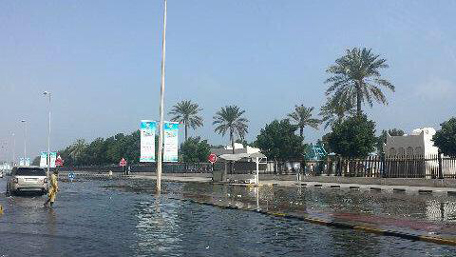
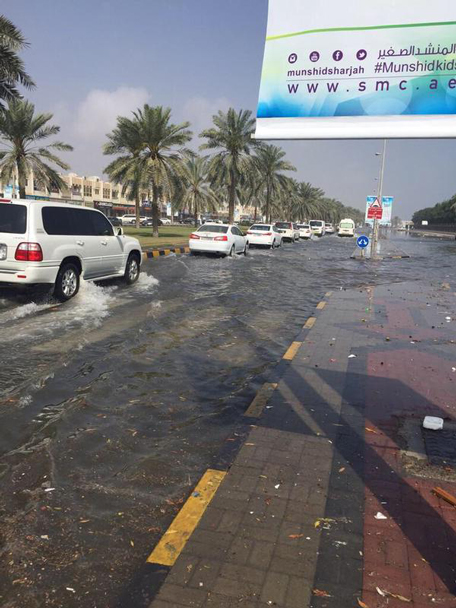 All posted by Tareef Kalba on Twitter
All posted by Tareef Kalba on Twitter
Talking further about the marine warning in place, the NCMS spokesperson has warned people to stay away from the coast, specifically in Khor Kalba and parts of Dibba, saying: “The Kalba region is quite low lying with waters from the Oman Sea causing a tidal surge that have reached over seven feet on Saturday, bringing this inland.
“Meanwhile, the waters of the Arabian Gulf have recorded waves of 10 feet or more, but due to its geo positioning, the marine warning there is more in place for those venturing into deep waters.”
The weather bureau further added: “However, there is a relief in the temperature, with the country witnessing nearly a 10-degree drop in the Mercury, from reaching highs of 39-degree Celsius on Thursday to nearly 26-degrees on the coming Monday.”
Meanwhile, the UAE’s NCMEA tweeted safety guidelines in wake of the storm, saying: “Put a mask over your nose and mouth, and protect your eyes if stepping outside. “If you are required to stop the vehicle, make sure you have completely moved off the road and call your family to reassure them you are safe.”
The NCMEA also stated if visibility drops further, drive the vehicle on the main roads where possible, and keep your headlights switched on.
The National Centre of Meteorology and Seismology (NCMS) has warned motorists to be cautious, reduce speed and leave enough space among vehicles due to a sandstorm.
It added that the winds led to low visibility of less than 1,000 metres in many areas nationwide.
Horizontal visibility is down to 500 metres at Dubai's Al Maktoum airport. Visibility is also down in Abu Dhabi, Al Ain, Sharjah, Bateen and Dubai Airports due to dust blowing, the NCMS has informed .
UAE woke up to a second day of heavy dust and sand in the air – a wave of the same blowing through the air at a brisk pace.
Roads bore signs of debris leftover from heavy spells of the Friday dust-sand storm as motorists were urged to driver carefuly.
The National Centre of Meteorology and Seismology (NCMS) in its forecast for the day had hazy and dusty weather, at times cloudy.
The winds will be moderate to fresh southerly changing gradually to become north westerly fresh to strong especially over the sea, causing blowing dust/sand and poor visibility over inland.
It also anticipated a significant drop in temperature especially in the west part of the country.
Clouds will increase over islands, coastal and northern areas with probability of scattered rain during night and Sunday morning especially, the Met office said.
The winds will blow from Southwesterly to Northwesterly at a speed of 30-40/55km /hr in general, reaching 65km/hr over sea at times.
Sea will be rough to very rough and wave heights will be from three to five and six feet near the coast and from eight to ten and 12-feet in the deep sea.
Sandstorm on Friday
According to the UAE weather bureau, the country is experiencing fresh to strong southerly wind at 60kms per hour, blowing dust and sand.
Visibility has dropped to less than1,000 meters in Al Hamra. Meanwhile, eight feet high waves have been recorded over some areas of Arabian Gulf.
According to the weather bureau, Friday’s conditions could see a spike in the Mercury with highs hovering near the 40-degree Celsius mark, with the only respite coming in the partly cloudy skies.
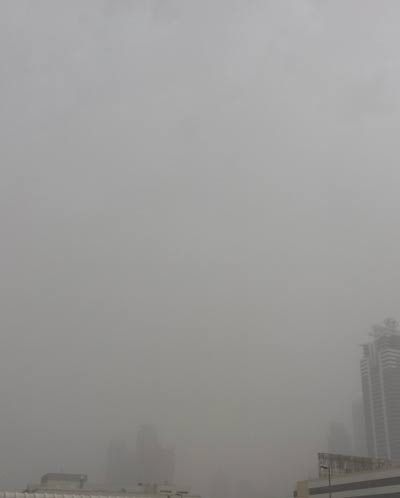
(Viktoriya Miteva)
The NCMS stated: “Friday will be hazy, dusty weather in general, becoming partly cloudy at times over some areas with another slight rise in day temperatures.
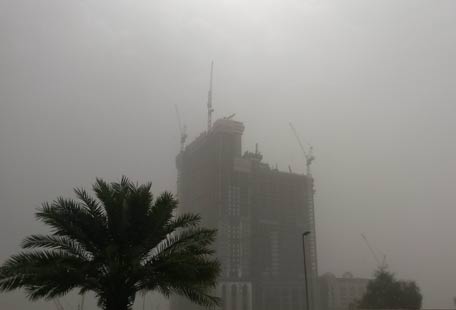 (Viktoriya Miteva)
(Viktoriya Miteva)
“Moderate to fresh southerly winds will cause blowing dust, sand and reduce horizontal visibility.”
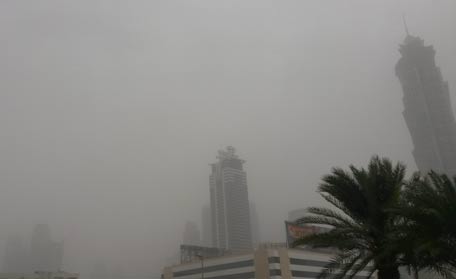 (Viktoriya Miteva)
(Viktoriya Miteva)
However, Saturday will blow in some respite from the sweltering heat, with the NCMS stating further: “It will be partly cloudy in general; cloud amount will increase over some coastal areas and islands with a chance of light rain.
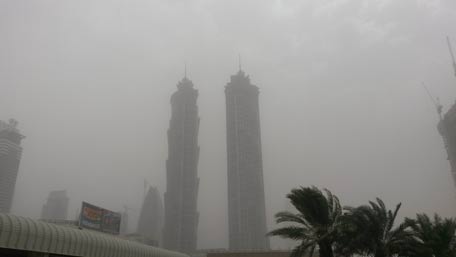 (Viktoriya Miteva)
(Viktoriya Miteva)
“There will be a significant fall of temperature over western areas and the other areas gradually.”
Meanwhile, a marine warning is in place for both days, with the NCMS stating the sea will be rough to very rough in the Arabian Gulf and choppy in the Oman Sea.
![]() Follow Emirates 24|7 on Google News.
Follow Emirates 24|7 on Google News.